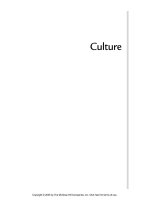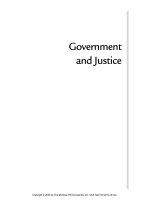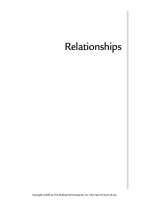Tài liệu 400 must have words for the toefl part 16 doc
Bạn đang xem bản rút gọn của tài liệu. Xem và tải ngay bản đầy đủ của tài liệu tại đây (562.53 KB, 10 trang )
Usage tips
Bureaucratic implies that something is inefficient and
unnecessarily complicated.
Parts of speech
bureaucracy
n
4.
condemn v.
To speak out against something in very strong terms
Religious radicals condemned the government for allowing alcohol
to be sold in restaurants.
Parts of speech
condemnation
n
5.
evidence n.
Something that makes the truth of a statement seem more
likely
The most convincing evidence that Garner robbed the store was a
videotape from surveillance cameras.
Parts of speech
evidence
v,
evident
adj,
evidently
adv
6.
implicate v.
To suggest that someone was involved in a crime or other
wrong behavior
No group claimed responsibility for the bombing, but the type of
explosive used implicates the Heartland Freedom Militia.
Usage tips
Implicate is often followed by in.
Parts of speech
implication
n
7.
inquiry n.
An investigation
The FBI launched an inquiry into the relationship between organ-
ized crime and the trucking company.
Parts of speech
inquire
v
8.
intrusively adv.
In a way that brings an unwanted person or thing into
someone else’s affairs
The new consultant from company headquarters appeared
intrusively at meetings, staff parties, and other functions where he
was not wanted.
Parts of speech
intrude
v,
intrusion
n,
intruder
n,
intrusive
adj
134
Government and Justice
www.just2download.blogspot.com
9.
seize v.
To take something against its owner’s will
Federal agents can seize private homes and other property possibly
used in the production or sale of illegal drugs.
Parts of speech
seizure
n
10.
surveillance n.
A process of watching something or someone for a
long time, usually because the person is suspected of something
Police surveillance of one suspected car thief resulted in the arrest
of a whole gang of carjackers.
Usage tips
Surveillance is often followed by an of phrase.
TOEFL Prep I
Find the word or phrase that is closest in meaning
to the opposite of each word in the left-hand column. Write the let-
ter in the blank.
1. ascertain (a) unnoticeably
2. intrusively (b) simple and straightforward
3. seize (c) give back
4. condemn (d) cause doubt about
5. bureaucratic (e) praise
TOEFL Prep II
Complete each sentence by filling in the blank
with the best word from the list. Change the form of the word if nec-
essary. Use each word only once.
apprehend evidence implicate inquiry surveillance
1.
Officials could not __________ Basil because people in villages and
towns throughout the country were willing to hide him.
2.
During their __________ of O’Brien’s house, detectives audiotaped his
phone conversations.
3.
Until we finish our __________ into the disappearance of the cash, all
employees are suspects.
4.
Even if there is __________, such as fingerprints, that might
__________ someone in a crime, there might be other indications that
the person is innocent.
The Police
135
www.just2download.blogspot.com
TOEFL Success
Read the passage to review the vocabulary you
have learned. Answer the questions that follow.
The Fourth Amendment to the U.S. Constitution protects citizens from
unreasonable search and seizure. Some civil libertarians have
condemned the federal antidrug bureaucracy for threatening this basic
right. In a drug case, police need no evidence to intrude on private
property, apprehend a suspected dealer, and seize all the person’s
property. Property taken under this law may be sold for a profit later
by the law-enforcement officials involved in the raid. The target of a
raid might be implicated only by an unreliable report from an un-
friendly neighbor. The police are not required to ascertain whether
there’s any physical evidence of drug activity at the site.
In one case, surveillance of a large California property
convinced local authorities to seize it—not because they saw
drug activity but because the property was worth a lot of
money. The property was taken, and its owner was shot
trying to defend himself. A later inquiry determined that there were no
illegal drugs on the property.
1.
According to this reading, which of these activities does the author
oppose?
a.
marijuana possession
b.
surveillance
c.
property seizures
d.
civil libertarians
2.
Why does the author of this reading mention the Fourth Amendment?
a.
because drug-related seizures seem to violate it
b.
because it outlaws the use of certain drugs
c.
because it has finally stopped the antidrug forces from seizing
property
d.
because he disagrees that Americans should be protected by it
136
Government and Justice
Bonus Structure—
In one case
introduces an
example.
www.just2download.blogspot.com
Lesson 27
The Police
TOEFL Prep I
1.
d
2.
b
3.
e
4.
a
5.
c
TOEFL Prep II
1.
apprehend
2.
surveillance
3.
inquiry
4.
evidence, implicate
TOEFL Success
1.
c
2.
a
The Police
137
www.just2download.blogspot.com
LESSON
Investigating Crimes
Target Words
1.
analyze
6.
inference
2.
assail
7.
objectively
3.
contrary
8.
suspicious
4.
hypothesize
9.
tolerate
5.
impair
10.
versus
Definitions and Samples
1.
analyze v.
To examine something by looking at its parts
Chemists analyzed the white powder and found it to be only a mix-
ture of sugar and salt.
Parts of speech
analysis
n,
analyst
n
2.
assail v.
To attack or criticize forcefully
With DNA evidence from the crime scene, the defense lawyer
assailed the police for falsely arresting his client.
Parts of speech
assault
n,
assailant
n
3.
contrary adj.
Opposite
Contrary to most studies, Dr. Ito’s work shows the world’s climate is
not getting warmer.
Usage tips
Common phrases are contrary to and on the contrary.
28
Copyright © 2005 by The McGraw-Hill Companies, Inc. Click here for terms of use.
www.just2download.blogspot.com









